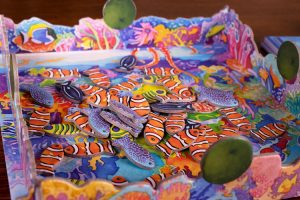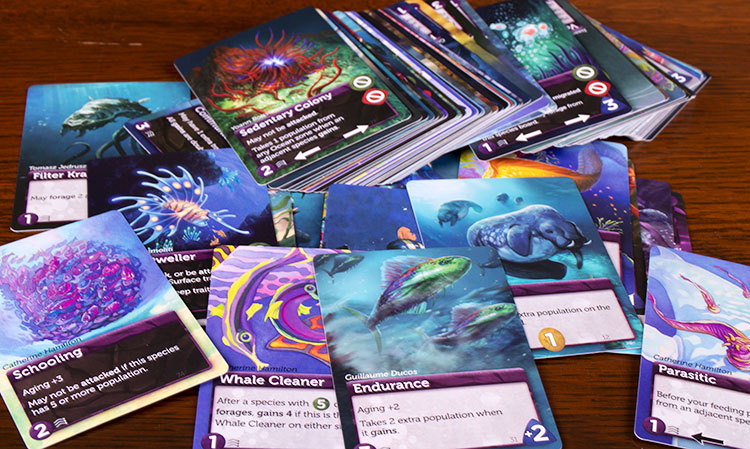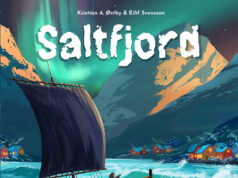 “The ocean stirs the heart, inspires the imagination and brings eternal joy to the soul.”
“The ocean stirs the heart, inspires the imagination and brings eternal joy to the soul.”
―Robert Wyland
Today we are looking at Oceans from NorthStar Games. This is a game about building diverse species of underwater creatures and adapting them to survive and thrive. While there are some similarities to Northstar’s previous title, Evolution, Oceans is truly its own game, not an expansion of any kind. So strap on your scuba gear and get ready to dive into this new engine-building game.
Gameplay Overview:
Games of Oceans take place over a number of rounds, with each player taking a turn in a clockwise manner. On a player’s turn they first evolve a species by playing a card; either starting a new species, adding the card to an existing one, or migrating fish from one ocean box to another. Each species can have up to three traits that will drastically alter how it thrives and survives.

Next, they choose one species to feed, either grazing from the reef or attacking another species (chomp). Each species can hold up to 9 fish before they overpopulate and lose half, so be careful with your gluttonous creations.
Then each species the player controls is aged, removing one fish token and adding it to their score pile. If a species ever doesn’t have enough fish to full age, it goes extinct and is sent to the discard pile. Finally, their turn ends by drawing back up to 4 cards.
At some point during the game, the first ocean area empties and the Cambrian Explosion happens. At that point, things change up a little. Players now play two cards every round, age species twice, and can now play deep cards. The deep deck is a stack of 100% unique cards that can give your species all kinds of crazy powers. However, they cost fish out of your score pile to play.
The game ends once all ocean areas have run out of fish. The round is finished and players total up the fish in their score pile and on their species board. The player with the most fish wins.

Game Experience:
I’m not going to spend much time comparing Oceans to Evolution, as I feel a game should be weighed on its own merits. That being said, if you’ve played Evolution before, there will be some similarities here. Yet this is much more than a reskin. Oceans is its own game, and an excellent one at that.
In the early turns of Oceans, there is a slow build up of your engine. Things lazily move along in the one card, one feeding pace as your species slowly begin to evolve. Most players are also usually content to graze from the reef for now, which is in amply supply early in the game.

However, at some point, that reef is going to run out of fish. Then its decision time, do you start using your cards to migrate fish over, helping everyone? Or maybe its time to become an apex predator, chowing down on your neighbors (or maybe even your own species). Yup, you can straight up attack other players species, stealing their hard-earned fish. And that’s one thing Oceans has in spades, player interaction. From direct attacking other players to synergistic cards like whale cleaner or symbiotic that trigger off your other species actions, except to be paying attention even when it’s not your turn.
The downside of that is, unlike in Evolution’s simultaneous turns, the pacing in Oceans is a bit slower. Northstar Games offers a 5-6 player expansion for Oceans, but to be honest, I’d never play with more than 4. The game length would just drag on too long (and the downtime as well).
So yes, the early games of Oceans are slow and calculating, with a steady build of up species and score piles. But then the Cambrian Explosion happens. At some point during the game, the first ocean area will empty out, freeing that Cambrian Explosion card. When this happens, the pacing of the game is taken up to 11. All of a sudden, card play and aging are doubled, and now the deep cards are freed.

The deep deck is made up of 89 wholly unique cards. While the standard surface deck has only 12 different cards, the deep throws all that out the window (in a good way). All of a sudden that careful ecosystem you’ve been cultivating is thrown for a loop once you start adding some of these powerful traits to your species. Such as Leviathan, which gives your species an attack of 5 and can’t be attacked itself. Or maybe you want to give your Apex Predator a crushing jaw that ignores all defense when attacking. The deep cards are all over the place and they are fantastic. The catch is that you have to pay for them out of your score pile, so you must calculate what they bring to the table vs what they cost to play.
For those who are a bit concerned with the complexity of using deep cards, there is an option to play with the Reef variant, which makes Oceans a more family-friendly game. This mode gets rid of the deep deck altogether and uses two fairly benign scenario cards. I haven’t really talked about the scenarios, but you use two random ones each game that triggers when their ocean areas are emptied—hurray for more replay value.
Overall, I’m loving Oceans a ton. My only real complaint about the game is with the trays and the fish. The fish are a bit thin and fiddly to pick up and move around. It got somewhat annoying in our games, so I made some 3D printed fish that were much easier to handle. Northstar will also be selling acrylic ones on their website. The other issue is with the Ocean boxes. It’s way too easy for fish to slide under the walls. I’m going to glue mine down, but overall, it might have been better to have flat tiles instead as it can be hard to tell what’s left in a box without picking it up and shaking it.

Final Thoughts:
Oceans is a fantastic game that I’ve gotten to the table way more than I expected. The Reef variant works excellent as a family game, and the deep deck keeps the second half of the game interesting when it could have gotten stale. And I haven’t even touched on the fantastic artwork from Catherine Hamilton, who did the cover and all the surface cards. Her watercolors are amazingly well done and fit the game perfectly.
Honestly, my only complaints about Oceans were some minor ones with the components. Players should also be aware that Oceans does have the potential to be a mean game, but chances are, you are going to be mean to everyone. This isn’t really a gang up on the leader type of game. Oceans keeps drawing me back in for a dive again and again. I love exploring the deep deck, and building up your species is a ton of fun.
Final Score: 4.5 Stars – An excellent engine building game with fantastic artwork and tons of replay value.
 Hits:
Hits:
• Deep deck and scenario cards add a lot of replay value
• Excellent artwork
• Family variant works really well
• Solid player interaction
Misses:
• Production issues with the trays and fish
























How would you compare Oceans vs Darwin’s Choice?¿
Sorry, haven’t played Darwin’s Choice, so I’m not going to be much help with that comparison.